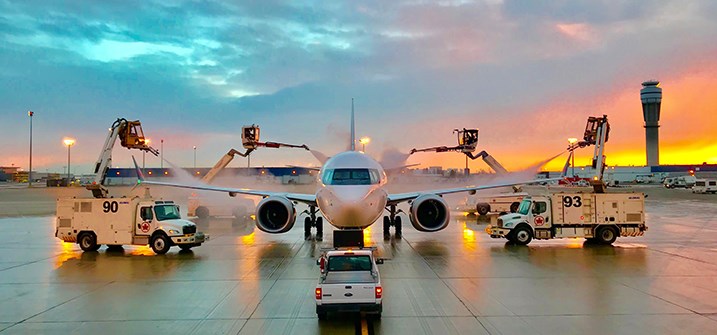It was a perfect storm that led to some long delays for passengers hoping to board flights that originated from Prince George this weekend.
The two de-icing trucks at Prince George Airport that spray a heated glycol-water mix to remove ice buildup on planes to allow them to fly in cold temperatures have broken down.
One truck broke down earlier in last week and the other went down at 6 a.m. Friday morning when the compressor that forces out the de-icing liquid failed. The de-icing equipment and crews are contracting out to a service provider by the airlines and are not owned or operated by the Prince George Airport Authority (PGAA).
“Typically, if one breaks down they share the remaining one,” said PGAA chief executive officer Gordon Duke. “In this case, for the first time in the eight years I’m aware of, one broke down last week and they were working on fixing it, and Friday morning, with the extreme cold, things break easier and the other one blew a hydraulic pump.”
Several flights have been affected while ground crews at the airport wait for replacement compressor to arrive from Ontario. Passengers departing who have booked flights leaving the city are being asked to check the Prince George Airport Authority’s website for updated information on those flights.
Duke said a crew of technicians is at an airport garage with the de-icing truck awaiting the arrival of a new pump which was left on a flight from Ontario at 6 a.m. Sunday. Another de-icing truck is on its way from Abbotsford and Duke anticipates both will be operational by Monday.
At the time the problem cropped up Friday morning WestJet and Air Canada had two jets parked at the airport which were substantially delayed. Duke said the WestJet flight to Vancouver left six hours later than scheduled, while the Air Canada plane, also destined for Vancouver, was delayed by 13 hours.
Flights that originated from other cities were not severely delayed because they were not on the ground long enough for ice to form, but the snowfall Saturday did cause minor delays as crew worked to keep planes free of snow and runways clear.
“Right now, I believe most flights are operating close to schedule because they’re getting de-iced at their station of origin, and coming into Prince George, loading up and leaving,” said Duke, Sunday afternoon.
Ice that forms on planes can negatively affect flight aerodynamics and the control surfaces of the aircraft, and if chunks of ice break off during flight they can damage the engines. In some instances, ground crews also spray thicker anti-icing propylene glycol fluids which stick to surfaces to prevent ice from forming.
“Those decisions are made by the pilot in charge and the ground crew on should they de-ice an airplane and to what level,” Duke said.
The Arctic air that moved into the city overnight Thursday dropped temperatures close to -30 C Friday morning and wind chills made it feel closer to -35 C. It remained below -10 C all day Saturday and by 9 a.m. Sunday morning the mercury was still hovering close to -26 C.
Duke says he sympathizes with passengers who have had to wait so long to get to their destinations.
“It’s just really bad timing,” he said. “I know this time of year, Christmas, people have been cooped up for a while because of COVID and they made plans to be with their families for the first time maybe in a year and I understand how emotional and tough it is for people.
“We’re doing all that is possible to get the situation fixed. It is a little awkward in that we don’t own, operate or maintain the equipment but we’re just doing our best to help people get through this and support our airline partners to rectify the situation.”
Duke said passenger traffic at Prince George Airport has been steady through the pandemic and most flights are close to capacity with a constant flow of sun-seekers, healthcare workers, tradesmen and construction workers using the terminal.
“With the road closures in B.C., flights are full in and out of Prince George, and we have seen pretty solid traffic because of all the essential travel and all the resource-based industry and people going in and out of camps,” said Duke.
“Prince George has done moderately better than most airports because of that traffic and our role as an essential service.”



